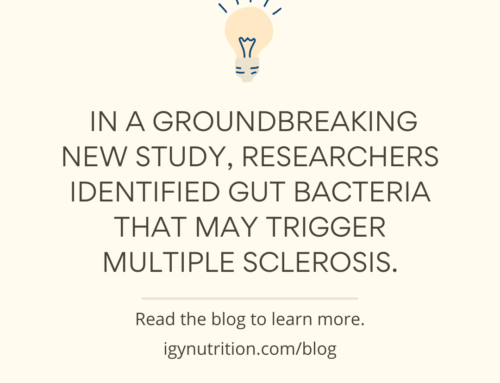While probiotics and prebiotics can help improve and maintain a healthy gut balance, there are many other factors that can impact the microbiota.
For example, environmental factors, including one’s diet, play a huge role in shaping the composition of the intestinal microbiome. In fact, dietary changes can account for up to 57% of changes in the microbiota.
Recent research has highlighted the link between diet and microbial diversity and, in turn, overall gut health. Specifically, it has been shown that the amount, type, and balance of protein, carbohydrates, and fat have a profound impact on gut balance.
Emerging evidence has implicated high-fat diet-induced changes in the gut microbiome as contributing to obesity and its associated complications.
Research has established the involvement of a host-microbiome interaction in the development of weight gain, obesity, and metabolic dysfunction.
Several studies have shown evidence that alterations in gut microbiota may contribute to obesity and metabolic dysfunction, directly or as a consequence of the disturbances in the gut microbiota that causes the “low-grade” inflammation that may promote the development of the dysfunction.
Essentially, an unhealthy diet leads to an increase in unhealthy bacteria, which creates an unhealthy gut.
Therefore, it makes sense that a healthy diet will lead to a healthy gut.
In fact, the consumption of diets higher in fruit, vegetables and fiber is linked to increased microbial diversity, which can occur in as little as 24 hours after making a dietary change [1,2].
As shown by a recent study by Haro et.al. (2016), the consumption of a Mediterranean diet, containing phenolic-compound-rich foods such as fresh fruit, vegetables, red wine and olive oil, induced significant positive changes in the composition of gut microbiota in obese individuals with metabolic dysfunction [3].
In addition to diet, exercise has been shown to produce a more diverse microbiota and reduce unhealthy bacterial communities while increasing communities of beneficial flora [4].
However, even physical health isn’t the only factor you need to consider.
It has been shown that different types of psychological stress can alter the composition of gastrointestinal microbiota.
In turn, your resilience to stress- and immune-related disorders (as well as dysfunction of stress- and immune-responses) may be dependent on the diversity and complexity of gastrointestinal microbiota [5].
In conclusion, it is clear that a healthy lifestyle including a diet rich in fruits and vegetables that also incorporates probiotics and prebiotics, along with exercise and stress-management all play a role in maintaining a healthy balance in the gut, which in turn helps to prevent obesity and its related conditions.
Once again, an overall healthy lifestyle is the key.
And learn why what happens in your gut doesn’t always stay in your gut.
References:
1. Ojeda P, Bobe A, Dolan K, Leone V, Martinez K. Nutritional modulation of gut microbiota – the impact on metabolic disease pathophysiology. J Nutr Biochem. 2016;28:191-200. doi: 10.1016/j.jnutbio.2015.08.013. Epub 2015 Aug 20.
2. Walsh CJ, Guinane CM, O’Toole PW, Cotter PD. Beneficial modulation of the gut microbiota. FEBS Lett. 2014; 17:588(22):4120-30. doi: 10.1016/j.febslet.2014.03.035. Epub 2014 Mar 26.
3. Haro C, Montes-Borrego M, Rangel-Zúñiga OA, Alcalá-Díaz JF, Gómez-Delgado F,et.al. Two Healthy Diets Modulate Gut Microbial Community Improving Insulin Sensitivity in a Human Obese Population. J Clin Endocrinol Metab. 2016;101(1):233-42. doi: 10.1210/jc.2015-3351. Epub 2015 Oct 27.
4. Campbell SC, Wisniewski P. Exercise is a novel promoter of intestinal health and microbial diversity. Exercise and Sport Sciences Reviews. 2017;45(1):41–47. doi: 10.1249/JES.0000000000000096
5. Rea K, Dinan TG, Cryan JF. The microbiome: A key regulator of stress and neuroinflammation. Neurobiology of Stress. 2016;4:23-33. doi:10.1016/j.ynstr.2016.03.001.
#microbiota #dysbiosis #bacteria #stress #prebiotics #microbiome #anxiety #gutflora #healthylifestyle #diet #probiotics #guthealth #microbialdiversity



